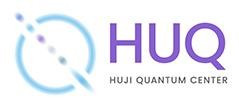
We are pleased to announce the Quantum Information Science Center's very first Quantum Information Workshop.
Speakers:
-
Prof. Dorit Aharonov (Computer Sciences)
-
Dr. Hagai Eisenberg (Physics):
"Generating Controlled Decoherence"
Quantum decoherence is usually an unwanted effect, and efforts are made to minimize it. It appears that creating such noise with well defined properties is also a hard task. I will present a way in which we apply such noise in a controllable way on quantum bits encoded in the polarization of single photons. We then apply this noise to pairs of entangled photons and study the dynamics of entanglement under noise
-
Dr. Omri Gat (Physics):
"Entangled Schroedinger Cats in Circuit QED"
Superconducting circuits process quantum information by coupling Josephson junction qubits with electromagnetic modes. Qubit mediated interaction between two modes prepared in highly-excited coherent states generates two-mode entanglement composed of macroscopically distinct states. I will show that the two-mode state exhibits two types of entanglement, Bell-like and two mode squeezing, and that there is a trade-off between the degree of entanglement and Bell inequality violation of each entanglement variable. Filtering by weak quadrature measurement produces a superposition of products of squeezed coherent states, that is the CQED version of entangled Schroedinger cats.
-
Mr. Eyal Cohen (Engineering, Paltiel group):
"In The Footsteps of Mother Nature: Harnessing Quantum Mechanics
Nano-structures are likely to become primary components of future quantum electronic devices. In our work we aim to achieve quantum properties in standard devices using nano-toolbox hybrid approach. The nano-toolbox, consisting of metal nano-particles, semiconductor nano-crystals and organic molecules, uses organic-inorganic couplings, enabling assembly of bottom-up building blocks with quantum properties coupled to classical top-down semiconductor measurements devices. Several mechanisms existing in nature uses quantum mechanics properties in order to achieve extraordinary results. One well known example is the high photon conversion efficiency of photosynthetic light-harvesting complexes. Recent experimental results have raised the fascinating possibility that quantum coherent dynamics play a role in the photosynthetic energy transfer, even at room-temperature. According to theoretical models, these quantum phenomena improve the stability and the efficiency of the system. In my research I plan to use our group’s experimental and nano-engineering tools in order to build a toy-model of organic mechanisms which exist in biological systems. By doing so we wish to mimic nature’s light harvesting complexes in practical realization of quantum devices operating in room-temperature. An arsenal of different nano-particles and organic molecules would allow our experimental model to be controllable and tunable. We hope that by investigating the quantum effects in this simplified model we could confirm the existence of quantum phenomena in biologic complexes, and achieve understanding regarding their role.
-
Prof. Nir Davidson (Physics, The Weizmann Institute)
-
Prof. Gil Kalai (Mathematics)
"Is Quantum Fault Tolerance Possible? My Debate With Aram Harrow"
The feasibility of building quantum computers that can out-perform digital computers is one of the most fascinating and clear-cut scientific problems of our time. The main concern is that quantum systems are inherently noisy. Roughly what this means for QC’s is that the internal states of quantum registers may vary unpredictably outside the range that allows the algorithm to continue. In the lecture I will describe some highlights in a recent discussion between Aram Harrow and me on the possibility within quantum mechanics that universal quantum computers are impossible.
Schedule for the workshop:
| 9:00-9:20 | gathering + coffee |
| 9:20-9:30 | Opening words (Nadav Katz) |
| 9:30-10:10 | Dorit Aharonov |
| 10:10-10:50 | Hagai Eisenberg |
| 10:50-11:15 | Coffee and discussion |
| 11:15-11:55 | Omri Gat |
| 12:00-12:40 | Lunch |
| 12:40-13:20 | Nir Davidson |
| 13:20-13:40 | Eyal Cohen |
| 13:40-14:20 | Gil Kalai |

